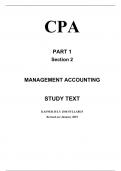Exam (elaborations)
MANAGEMENT ACCOUNTING STUDY TEXT
- Course
- Institution
MANAGEMENT ACCOUNTING GENERAL OBJECTIVE This paper is intended to equip the candidate with knowledge, skills and attitudes that will enable him/her to apply management accounting principles and concepts in business LEARNING OUTCOMES A candidate who passes this paper should be able to: - Estim...
[Show more]



